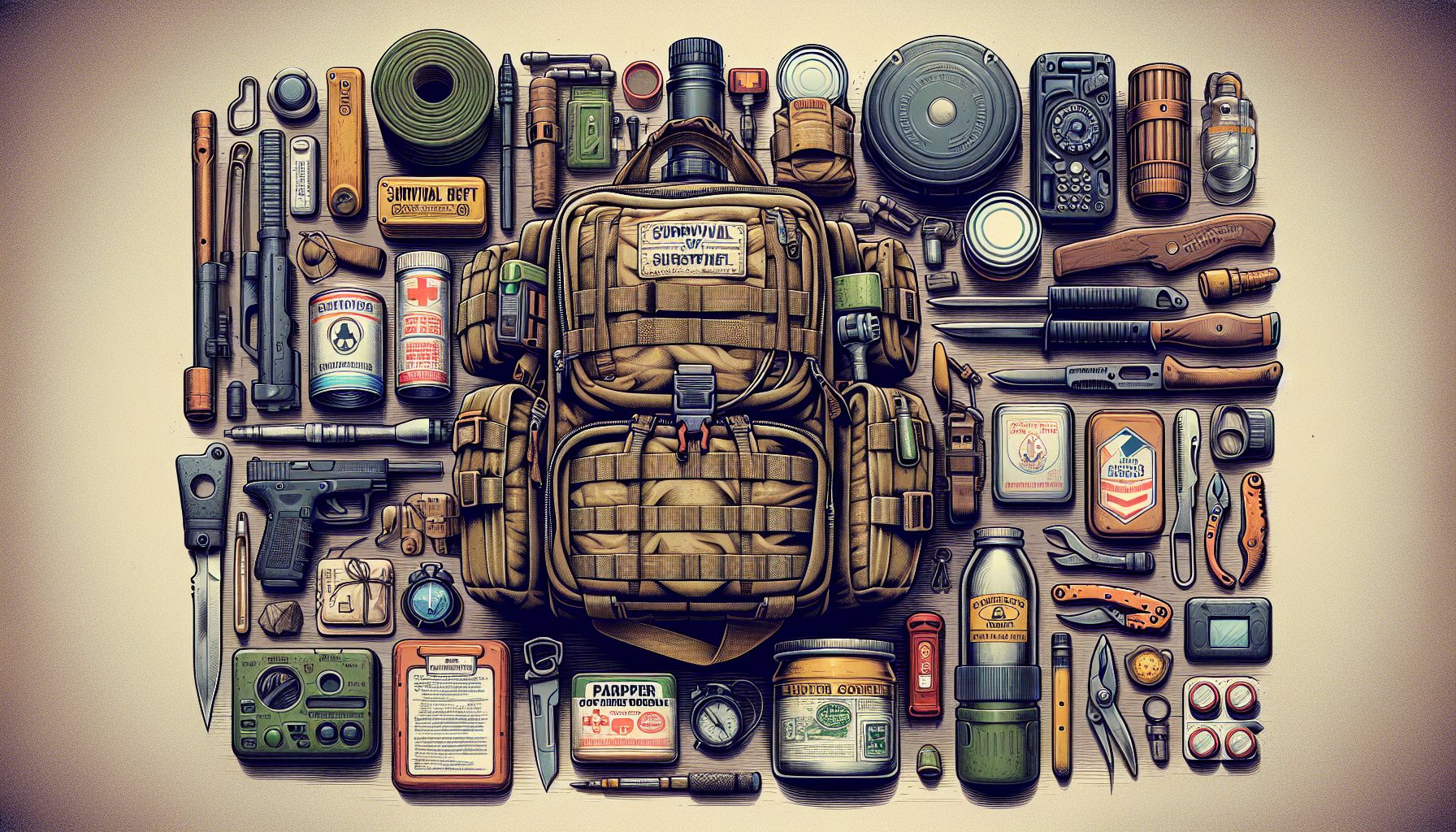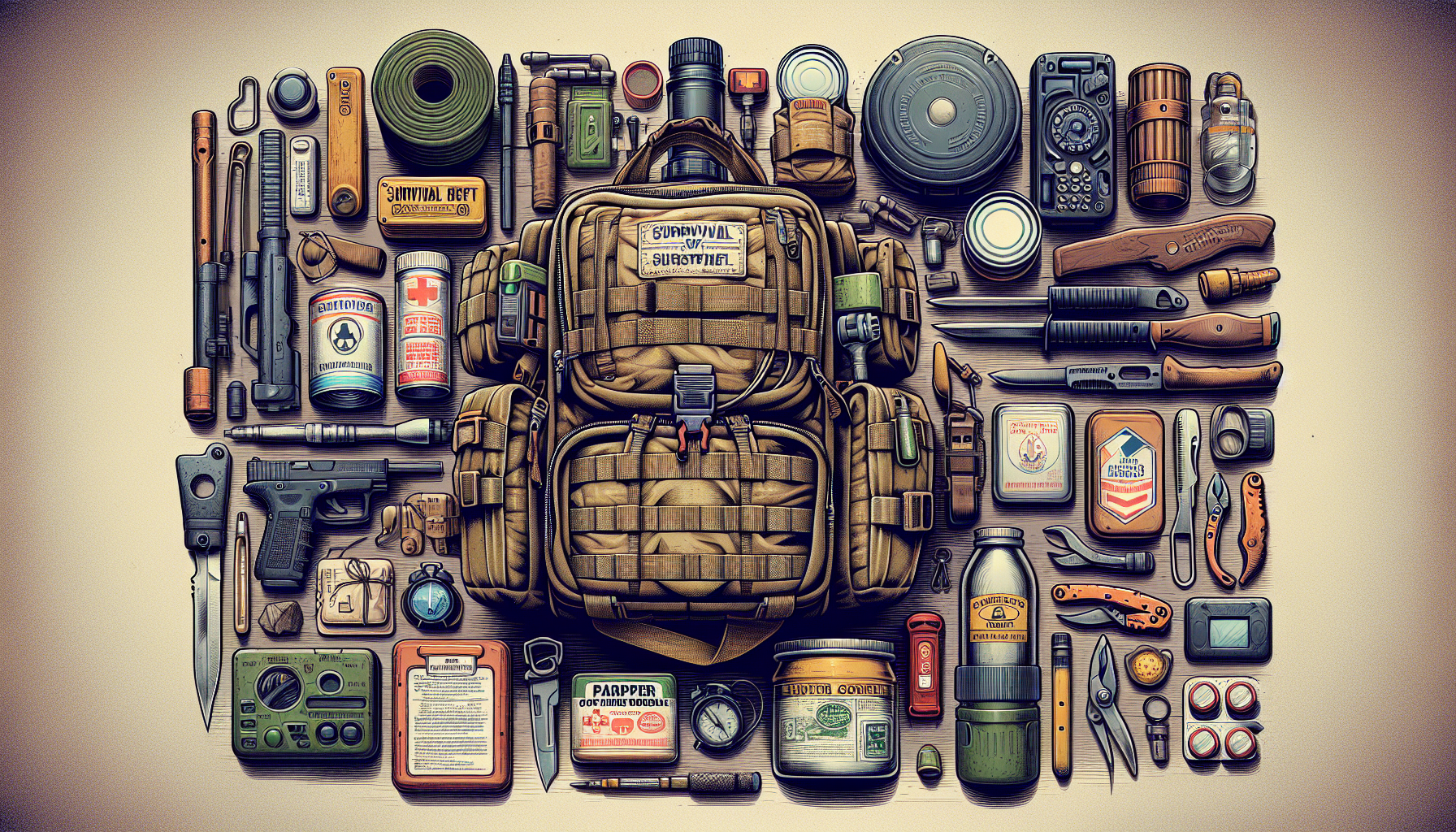Have you ever wondered why some individuals choose to become preppers? You know, those people who are constantly stocking up on supplies and preparing for the worst-case scenarios? Well, it turns out that there are various reasons behind this fascinating lifestyle choice. From a desire for self-sufficiency to a fear of global disasters, each prepper has their unique motivations driving them to take proactive measures. In this article, we will explore the intriguing reasons why people become preppers and uncover the mindset that propels them to prepare for the unknown. So, let’s delve into the world of prepping and discover the underlying factors that lead individuals to embrace this lifestyle.

Natural disasters
Protection against unexpected events
Being prepared for natural disasters is a top priority for many individuals. As a prepper, you understand the importance of having a plan in place to protect yourself, your loved ones, and your property when faced with unexpected events such as hurricanes, earthquakes, or floods. By taking the necessary precautions, such as stockpiling emergency supplies, creating evacuation routes, and reinforcing your home, you can minimize the potential risks associated with these disasters.
Desire to be self-sufficient
One of the main motivations for becoming a prepper is the desire to be self-sufficient. Preppers understand the importance of relying on themselves and their resources in times of crisis. Whether it’s growing your own food, generating alternative sources of energy, or even learning essential survival skills, being self-sufficient allows you to reduce dependency on external systems that may fail during uncertain times.
Fear of being unprepared
No one wants to be caught off guard during a crisis. The fear of being unprepared drives many individuals to become preppers. By actively preparing and planning for various disaster scenarios, you can alleviate the anxiety that comes with the uncertainty of the future. Preppers understand that being proactive and ready for any situation can make a significant difference in their overall safety and well-being.
Economic instability
Financial collapse
The possibility of a financial collapse is a significant concern for many people, fueling their motivation to become preppers. The events of past economic crises have shown how fragile the global financial system can be. Preppers take steps to safeguard their finances by diversifying investments, reducing debt, and acquiring tangible assets such as precious metals. By being financially prepared, they have a better chance of weathering the storm during economic downturns.
Hyperinflation
Hyperinflation, a rapid increase in currency value, can devastate an economy and erode the purchasing power of individuals. Preppers recognize the potential risks associated with hyperinflation and take measures to protect their wealth. By investing in tangible assets, such as real estate or commodities, they aim to preserve their purchasing power and maintain financial stability even in times of extreme inflation.
Job loss or economic recession
The fear of job loss or an economic recession is another driving factor for individuals to become preppers. Unforeseen circumstances, such as company closures or unexpected layoffs, can leave individuals and families vulnerable. Preppers understand the importance of developing multiple sources of income, acquiring valuable skills, and building an emergency fund to cushion the impact of such events. By having a resilient financial foundation, they can navigate through uncertain economic times with greater ease.
Political unrest
Fear of government collapse
Political unrest and the fear of a government collapse can lead individuals to become preppers. History has shown that political systems can be fragile, leading to instability and potential turmoil. Preppers, by being prepared and self-reliant, aim to mitigate the effects of political upheaval. They may acquire necessary supplies, develop communication networks, and establish alternative shelter options to ensure their safety and well-being in such scenarios.
Loss of trust in political systems
A loss of trust in political systems is a common sentiment among preppers. Skepticism towards authorities can arise from a variety of reasons, including perceived corruption, ineffective governance, or the erosion of civil liberties. In response, preppers take steps to protect their interests and exercise their independence by becoming self-sufficient. By reducing their reliance on governmental support, they aim to safeguard their rights and well-being, irrespective of political changes.
Skepticism towards authorities
Skepticism towards authorities is another factor that drives people to become preppers. This skepticism can stem from a sense of disillusionment with the way governments handle crises or a belief that authorities may not have the capacity to adequately respond to emergencies. By taking matters into their own hands, preppers can ensure their safety and security, relying on their own judgment and preparedness rather than relying solely on government assistance.
Pandemics and health crises
Protection against contagious diseases
In light of recent pandemics and health crises, people have become more aware of the importance of protecting themselves from contagious diseases. Preppers understand that being well-prepared can minimize their risk of exposure and increase their chances of staying healthy. They stockpile essential medical supplies, maintain good hygiene practices, and stay informed about disease prevention measures to protect themselves and their loved ones during such outbreaks.
Avoiding reliance on overwhelmed healthcare systems
During public health crises, healthcare systems can become overwhelmed, making it challenging to receive adequate medical care. Preppers recognize the importance of not overburdening these systems and, therefore, take measures to avoid reliance on them. By having a well-stocked first aid kit, basic medical knowledge, and alternative healthcare options, preppers can address minor injuries and illnesses without adding strain to overloaded hospitals and clinics.
Learning from past outbreaks
Preppers learn from past outbreaks and use that knowledge to inform their preparedness strategies. By studying historical data and understanding the patterns of previous epidemics or pandemics, preppers can anticipate potential risks and plan accordingly. They stay updated on the latest scientific research, follow advice from reputable health organizations, and adapt their preparedness measures based on the specific characteristics of each disease.

Terrorist attacks and war
Security concerns
Security concerns, particularly in the context of terrorist attacks and war, drive many individuals to become preppers. Preppers recognize that in times of conflict, personal safety becomes paramount. They take measures to enhance the security of their homes, such as reinforcing doors and windows, installing security systems, and developing contingency plans to protect themselves and their loved ones in case of any violent threat.
Worries about social unrest
The potential for social unrest during times of crisis is a significant worry that preppers consider. Whether it’s civil unrest, riots, or looting, the breakdown in social order can pose significant risks to personal safety and property. Preppers take steps to mitigate these risks by improving their situational awareness, developing community networks, and fortifying their homes to deter potential threats.
Potential disruption of supply chains
In the event of a terrorist attack or war, supply chains can experience significant disruptions. Preppers understand the risks associated with this and take measures to ensure their access to essential resources. By stockpiling food, water, and other critical supplies, preppers can sustain themselves for an extended period, reducing their reliance on external systems that may be compromised during times of conflict or chaos.
Environmental concerns
Climate change impacts
The impacts of climate change, such as extreme weather events and rising sea levels, are significant concerns for many individuals. As preppers, they recognize the need to adapt to these changing environmental conditions. From reinforcing their homes to withstand severe storms to exploring sustainable energy solutions, preppers take steps to mitigate the potential risks associated with climate change and ensure their resilience in the face of environmental challenges.
Pollution and its consequences
Pollution, both air and water, poses serious health risks and ecological damage. Preppers understand that pollution can have far-reaching consequences, such as contaminated water supplies or air pollution-related illnesses. They take proactive measures to reduce their environmental impact, such as minimizing waste production, using eco-friendly products, and investing in water and air filtration systems to ensure their health and well-being.
Preservation of natural resources
Preservation of natural resources is a key priority for many preppers. They understand that a sustainable future requires responsible stewardship of the earth’s natural resources. Preppers may engage in activities such as conserving water, planting gardens, supporting local farmers, and adopting eco-friendly practices to reduce their ecological footprint. By prioritizing the preservation of natural resources, they aim to create a more sustainable and resilient world for future generations.
Fear of technological failures
Concerns about power grid failure
The reliance on technology makes society vulnerable to power grid failures. Preppers recognize the potential risks associated with a power grid failure and take steps to mitigate the impact. They may invest in alternative energy sources, such as solar panels or generators, to ensure a continuous power supply. Additionally, they acquire the necessary knowledge and tools to handle potential electrical disruptions, ensuring their safety and comfort during such events.
Cyberattacks compromising essential services
In an increasingly interconnected world, the risk of cyberattacks compromising essential services is a growing concern. Preppers understand that disruptions to critical infrastructure, such as telecommunications, water, or transportation systems, can have severe consequences. They take measures to protect their digital assets, such as using encryption, backing up data, and staying vigilant against online threats. By being prepared for potential cyberattacks, preppers can minimize the disruption to their daily lives.
Dependency on technology
As technology becomes more integral to our lives, preppers recognize the potential risks associated with overreliance on it. They understand that technological failures or malfunctions can hinder their ability to carry out essential tasks. To mitigate this risk, preppers acquire and develop skills that can be performed without technology, such as gardening, basic mechanical repairs, and navigation techniques. This allows them to maintain their independence even if technological systems fail.
Desire for independence
Self-reliance and personal responsibility
The desire for independence drives many individuals to become preppers. They value self-reliance and personal responsibility, seeking to take control of their own lives and well-being. Preppers actively develop skills that enable them to meet their basic needs and handle challenges effectively, reducing their reliance on external systems. By prioritizing self-reliance and personal responsibility, they gain a sense of empowerment and peace of mind, knowing they have the ability to navigate through difficult times.
Reducing dependence on external systems
Preppers aim to reduce their dependence on external systems as much as possible. By acquiring essential skills, stockpiling necessary supplies, and developing local networks, they ensure they have the resources and support they need independent of external systems. This independence allows preppers to have greater control over their lives and well-being, even when faced with challenging circumstances.
Satisfaction from being self-sufficient
The satisfaction that comes from being self-sufficient is a significant motivation for preppers. By actively preparing and adapting to various scenarios, preppers gain a sense of accomplishment and security. They find fulfillment in being able to rely on themselves and their resources, knowing that they have taken the necessary steps to protect themselves and their loved ones. The readiness and resilience that preppers develop bring them a sense of satisfaction and peace of mind in an uncertain world.
Historical events
Learning from past disasters
Preppers understand the importance of learning from past disasters. By studying historical events, they gain valuable insights into the causes, effects, and responses to various crises. This knowledge enables them to develop informed and effective preparedness strategies. Preppers recognize that history often repeats itself in different forms and strive to stay ahead by leveraging the lessons learned from past disasters.
Repeating patterns in history
The recognition of repeating patterns in history is a fundamental belief held by preppers. They understand that similar crises have occurred in the past and will likely occur again in the future. By identifying these patterns, preppers can anticipate potential risks and adjust their preparedness efforts accordingly. This historical perspective helps them make well-informed decisions and increases their chances of successfully navigating through challenging times.
Survivalist mindset
A survivalist mindset is ingrained in many preppers. They embrace the philosophy of self-sufficiency and personal preparedness. This mindset encourages them to prioritize essential skills, resourcefulness, and adaptability. Preppers understand that survival, both in individual and societal contexts, requires a mindset focused on preparation, resilience, and the ability to overcome adversity. By adopting this mindset, preppers can better navigate through both everyday challenges and extraordinary crises.
Self-defense and protection
Necessity for personal and family safety
The necessity for personal and family safety is a primary concern for preppers. They recognize that during times of crisis, the dynamics of society can change rapidly, increasing the potential for violence and harm. Preppers prioritize self-defense by acquiring the necessary skills and tools to protect themselves and their loved ones. By being prepared to defend against potential threats, they can ensure the safety and well-being of their families.
Armed conflict concerns
Concerns about armed conflict drive preppers to take measures to protect themselves. They understand that violence, whether from local conflicts or larger-scale wars, can have a direct impact on their lives. Preppers develop strategies to stay informed about potential conflict zones, establish emergency communication plans, and secure their homes against potential intrusions. By being prepared for armed conflicts, preppers aim to mitigate the risks and increase their chances of surviving in high-risk situations.
Protection from looting or civil unrest
During times of crisis, looting or civil unrest can pose a significant threat to personal safety and property. Preppers take proactive measures to protect themselves and their belongings. They fortify their homes, invest in security systems, and develop community networks to deter potential looters. By taking steps to protect themselves from such risks, preppers can safeguard their assets and maintain a sense of security in uncertain times.
In conclusion, people become preppers for various reasons, driven by factors such as the desire for self-sufficiency, protection against unforeseen events, and a sense of personal responsibility. Whether it’s natural disasters, economic instability, political unrest, health crises, security concerns, environmental issues, technological failures, the desire for independence, historical events, or self-defense, the motivations behind prepping are multifaceted. By being prepared, preppers aim to increase their resilience, maintain their safety, and ensure their well-being during times of uncertainty.
